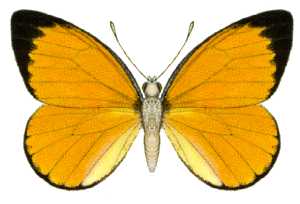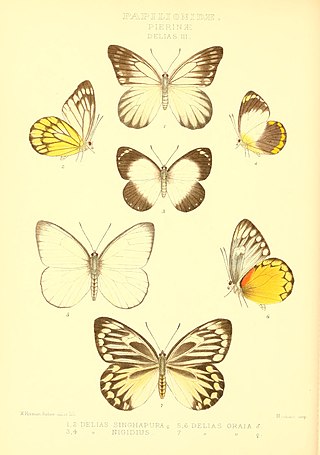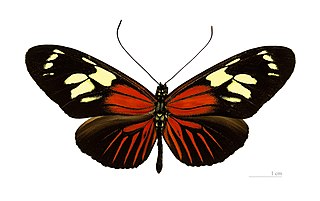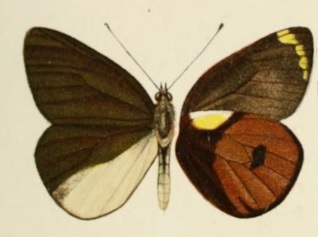Jezebel was a biblical figure, the wife of King Ahab.

Delias eucharis, the common Jezebel, is a medium-sized pierid butterfly found in many areas of south and southeast Asia, especially in the non-arid regions of India, Bangladesh, Sri Lanka, Indonesia, Myanmar and Thailand. The common Jezebel is one of the most common of the approximately 225 described species in the genus Delias.

Delias is a genus of butterflies. There are about 250 species of the genus Delias, found in South Asia and Australia. The genus is considered to have its evolutionary origins in the Australian region.

Sir George Hamilton Kenrick FRES was an English entomologist who specialised in Lepidoptera especially those of New Guinea. He was a prominent liberal educationist and was a councillor in Birmingham.

Delias kristianiae is a rare Papuan butterfly that is named after the former First Lady of Indonesia, Kristiani Herrawati. Kristiani Herrawati was presented with a specimen of D. kristianiae after the species was named, which she donated to a museum.

Delias argenthona, the scarlet Jezebel or northern Jezebel, is a medium-sized butterfly of the family Pieridae found in Australia and New Guinea. Its caterpillars feed on showy mistletoes, family Loranthaceae.

Delias mysis, the Union Jack or red-banded Jezebel, is a butterfly in the family Pieridae. It is endemic to northern Australia, New Guinea and neighbouring islands. The common name is a reference to the flag of the British Empire. The butterfly was given this name, because the patterns and colours on the underside of the wings of the males resembles the flag.

Delias aganippe, the wood white or red-spotted Jezebel, is a butterfly in the family Pieridae.

Delias aruna, the golden Jezebel, is a butterfly in the family Pieridae. It is found in Queensland, Irian Jaya, Maluku, Papua New Guinea and several surrounding islands.

Delias ennia, the yellow-banded Jezebel, is a butterfly in the family Pieridae. It is found in Australia, Indonesia, Papua New Guinea and several surrounding islands.

Delias nigrina, the black Jezebel or common Jezebel, is a butterfly in the family Pieridae. It is found along the eastern seaboard of Australia, from Queensland, through New South Wales to Victoria.

Heliconius burneyi, the Burney's longwing, is a butterfly of the family Nymphalidae. It was described by Jacob Hübner in 1831. It is found in the Amazon basin. The habitat consists of tall forests.

Delias pratti is a species of butterfly in the family Pieridae. The type was described by George Hamilton Kenrick in 1909. It is found in Papua New Guinea, the type location is the Foja Mountains.

Delias ninus, the Malayan Jezebel, is a butterfly in the family Pieridae. It was described by Alfred Russel Wallace in 1867. It is found in the Indomalayan realm.

Delias alberti is a butterfly in the family Pieridae. It was described by Walter Rothschild in 1904. It is found in the Indomalayan realm.

Delias fasciata is a butterfly in the family Pieridae. It was described by Walter Rothschild in 1894. It is found in the Australasian realm. It is endemic to Sumba.

Delias madetes is a butterfly in the family Pieridae.It was described by Frederick DuCane Godman and Osbert Salvin in 1878. It is found in the Australasian realm.

Delias rosenbergii, Rosenberg's painted Jezebel, is a butterfly in the family Pieridae. It was described by Samuel Constantinus Snellen van Vollenhoven in 1865. It is found on the Wallace line. The name honours William Frederick Henry Rosenberg.

Delias caeneus is a butterfly in the family Pieridae. It was described by Carl Linnaeus in 1758. It is found in the Australasian realm.















